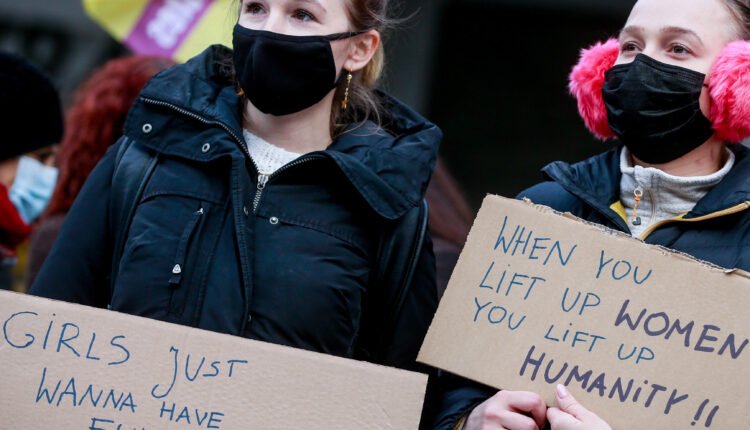Human rights examples include right to life, freedom of speech, and right to education. These rights are fundamental entitlements that all individuals possess.
Examples of Human Rights: Human rights play a crucial role in ensuring the well-being and dignity of every person. They are universal, inalienable, and are protected by international laws and regulations. Examples of human rights cover civil, political, economic, social, and cultural rights, which are integral to a just and equitable society.
Acknowledging and upholding these rights is essential for a harmonious and progressive global community. By understanding and respecting human rights, we can create a world where everyone is treated with fairness, equality, and compassion.
Human Rights Defined
Human rights are the foundation of a just and equal society. They represent the fundamental rights and freedoms that every individual is entitled to, regardless of their race, gender, religion, or any other status. The concept of human rights is deeply rooted in the principles of dignity, equality, and respect for all individuals.
It forms the bedrock of civil society and serves as a crucial framework for ensuring justice and empowerment for all. Here, we delve into the essence of human rights, exploring both legal and moral perspectives to define the significance and universal applicability of these rights.
Essence Of Human Rights
The essence of human rights lies in the recognition of the inherent dignity and worth of every person. It entails the belief that all individuals are entitled to certain rights and freedoms, without discrimination or prejudice. From the right to life and liberty to the freedom of expression and belief, human rights encompass a wide array of essential entitlements that safeguard the well-being and autonomy of individuals. They serve as a safeguard against oppression and exploitation, providing a framework for the protection and promotion of human dignity and equality.
Legal Vs Moral Perspectives
When assessing human rights, it is essential to consider both legal and moral perspectives. The legal framework encompasses international treaties, conventions, and domestic laws that codify and protect human rights. These legal mechanisms establish the rights and responsibilities of individuals, governments, and organizations, providing a basis for accountability and redress.
On the other hand, the moral perspective emphasizes the ethical and philosophical foundations of human rights, rooted in the belief that certain values and principles are universally applicable to all human beings.

Credit: www.prosperitycandle.com
Categories Of Human Rights
Human rights are fundamental rights and freedoms that everyone is entitled to by virtue of being human. These rights preserve dignity, equality, and respect for all individuals, without discrimination. Human rights are often categorized into three main groups: civil and political rights, economic, social, and cultural rights. Each category encompasses specific rights and entitlements that are essential for the well-being of individuals and society as a whole.
Civil And Political
Civil and political rights are essential for the functioning of a democratic society. These rights focus on enabling individuals to participate in the civil and political life of their community and country. Some examples of civil and political rights include the right to freedom of speech, right to a fair trial, right to vote, right to privacy, and the freedom from discrimination.
Economic, Social, And Cultural
Economic, social, and cultural rights are aimed at ensuring that individuals have the opportunity to lead a dignified life. These rights cover a wide range of areas including education, healthcare, housing, and the right to work. They emphasize the right to education, right to adequate standard of living, right to healthcare, right to work, and right to participate in cultural life.
Historical Evolution
When exploring the historical evolution of human rights, it becomes apparent that the concept of rights and freedoms has been a fundamental element of societies throughout history. From ancient philosophies to modern milestones, the evolution of human rights has been a journey of progress and struggle.
Ancient Philosophies And Rights
Ancient civilizations such as those in Mesopotamia, Egypt, and Greece laid the groundwork for the codification of rights and ethical principles. The Code of Hammurabi of ancient Mesopotamia is one of the earliest known legal codes highlighting the concept of justice and equality before the law. In ancient Greece, philosophers like Socrates and Plato advocated for the importance of individual liberties and the pursuit of truth and justice.
Modern Human Rights Milestones
The modern era has witnessed significant milestones in the development and protection of human rights. The Magna Carta, signed in 1215, is considered a crucial document in the history of human rights, as it limited the power of the monarchy and established the principle of the rule of law. The Enlightenment period ushered in a new era of emphasis on individual rights, reason, and progress, with thinkers such as John Locke and Jean-Jacques Rousseau contributing to the discourse on natural rights and social contracts.
The 20th century saw the establishment of pivotal international agreements aimed at safeguarding human rights, including the Universal Declaration of Human Rights adopted by the United Nations in 1948. This landmark document enshrines fundamental rights and freedoms for all individuals, regardless of race, religion, or nationality.
Protecting Human Rights
When it comes to protecting human rights, international bodies and non-governmental organizations play a vital role in ensuring that individuals are treated with dignity and respect. Here are some examples of entities and organizations that are committed to upholding human rights.
United Nations’ Role
The United Nations (UN) is at the forefront of protecting human rights globally. The UN has established various frameworks and conventions, such as the Universal Declaration of Human Rights, to safeguard the rights and freedoms of individuals worldwide. Through its various agencies and initiatives, the UN monitors and addresses human rights violations, advocates for justice, and provides humanitarian assistance to those affected by violations.
Human Rights Organizations Worldwide
Human rights organizations around the world are dedicated to promoting and protecting the fundamental rights of all individuals. These organizations work tirelessly to address issues such as discrimination, gender inequality, child labor, and other human rights abuses. They provide support to victims of violations, conduct advocacy and awareness campaigns, and collaborate with governments and other stakeholders to effect positive change.
Personal Freedoms Upheld
The protection and preservation of personal freedoms is a fundamental aspect of human rights. Upholding personal freedoms ensures that individuals have the space and autonomy to express themselves and live their lives without unwarranted interference. In the context of human rights, the guarantee of personal freedoms serves as a cornerstone for a just and equitable society.
Freedom Of Speech And Expression
The freedom of speech and expression is a crucial human right that empowers individuals to voice their opinions, beliefs, and ideas without fear of censorship or reprisal. It encompasses the right to seek, receive, and impart information and ideas through any media, including digital platforms, art, and public discourse. The principle of free speech extends to protecting minority viewpoints and unpopular opinions, fostering a diverse and inclusive society.
Right To Privacy And Security
The right to privacy and security safeguards individuals’ autonomy and personal space from unwarranted intrusion or surveillance. It encompasses the protection of personal data, communications, and living spaces, ensuring that individuals have control over their information and interactions. Privacy rights are essential for maintaining personal dignity, identity, and the ability to engage in activities without external interference.
Right To Equality
In the realm of human rights, the Right to Equality stands as a fundamental tenet, ensuring that all individuals are treated with fairness and impartiality. It serves as the cornerstone of a just and equitable society, challenging discrimination and promoting equal opportunities for every person, irrespective of their race, gender, religion, or other defining attributes.
Non-discrimination Principles
Non-discrimination principles are integral to upholding the Right to Equality. These principles dictate that no individual should be subjected to prejudice or bias based on characteristics such as race, ethnicity, gender, sexual orientation, or religion. The promotion of diversity and the acknowledgment of individual differences are at the heart of these principles, fostering a society that celebrates the uniqueness of each person.
Equal Opportunity Enforcement
Equal opportunity enforcement is crucial in ensuring that the Right to Equality is not just a concept, but a tangible reality. It involves creating and implementing policies and practices that provide fair chances for individuals to attain education, employment, and other vital resources. Enforcing equal opportunity fosters an environment where everyone has the chance to thrive and contribute to the betterment of society, regardless of their background or circumstances.
Access To Basic Needs
Access to basic needs is a fundamental human right that ensures individuals have the necessary resources to live a dignified life. This encompasses various aspects such as the right to education, healthcare, housing, and clean water. By guaranteeing access to these basic needs, societies can promote equality and well-being for all their members.
Right To Education And Healthcare
Education and healthcare are essential components of human rights. The right to education ensures that every individual has the opportunity to acquire knowledge and skills that are crucial for personal and professional development. This includes access to primary, secondary, and higher education, without discrimination.
Similarly, the right to healthcare encompasses the access to medical services, treatments, and facilities necessary to maintain physical and mental well-being. It ensures that individuals receive essential healthcare services regardless of their socio-economic status, geographical location, or any other discriminatory factors.
Housing And Clean Water Rights
Housing rights guarantee individuals the right to adequate shelter, which is essential for privacy, security, and overall well-being. This encompasses protection against homelessness, ensuring that everyone has access to safe, affordable, and habitable housing.
Clean water rights are crucial for maintaining good health and overall well-being. It ensures that individuals have access to safe and clean drinking water, free from contamination and pollutants. This right is vital for the prevention of waterborne diseases and overall public health.
Examples Of Human Rights Violations
Human rights violations are unfortunately common occurrences that can take place in various regions around the world. These violations can manifest in different forms, and addressing them is essential to ensure the protection of basic human freedoms and dignity.
Case Studies From Different Regions
Examples of human rights violations exist across the globe, shedding light on the realities faced by individuals in diverse geographical areas. Regions such as the Middle East, Africa, Asia, and the Americas have witnessed alarming instances of human rights abuses, each with its unique set of challenges and repercussions.
Responses To Rights Violations
When violations of human rights occur, it is crucial for individuals, organizations, and governments to respond swiftly and effectively. Taking proactive measures to hold perpetrators accountable, protecting the rights of the affected individuals, and implementing measures to prevent future violations are essential components in addressing human rights violations.
Frequently Asked Questions On Examples Of Human Rights
What Are Examples Of Human Rights?
Human rights examples include freedom of speech, education, and healthcare access.
Why Are Human Rights Important?
Human rights are essential for ensuring dignity, equality, and freedom for all individuals.
How Are Human Rights Protected?
Human rights are protected through laws, international treaties, and advocacy efforts.
What Happens When Human Rights Are Violated?
Violations of human rights lead to discrimination, injustice, and social instability.
Where Can People Seek Help For Human Rights Issues?
Individuals can seek help for human rights issues from organizations, legal services, and advocacy groups.
Conclusion
In sum, human rights are fundamental to creating a just society where every individual is treated with dignity and respect. By understanding and promoting human rights, we can work towards a world where equality and fairness prevail. It is vital to continue advocating for the protection and realization of human rights for all.



